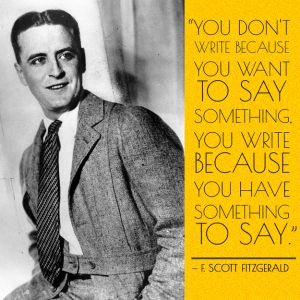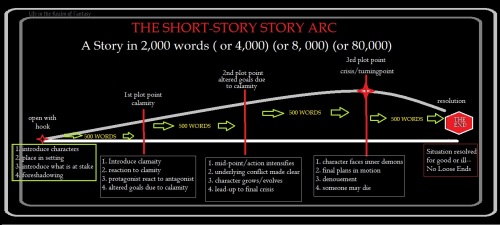For the author struggling to get their name out there, one of the best ways is writing and submitting short stories to magazines, contests, and anthologies. You might earn a little cash, and you have the added thrill that someone liked your work enough to publish it.
But how does one go about writing a short story? First, you need a theme, an idea or message that flows through a story from beginning to end. The theme is what readers think the work is about, but it is also what the work itself says about the central subject.
In a given work the theme might never be mentioned outright, but the characters’ actions are motivated by it, and the plot revolves around it. (In case you need it, here is a list of 101 common themes in books.)
The structure of the short story is the same as for a novel: it consists of the Story Arc, which is the term that describes plot structure, or the sequence of events that occur within a story.
Plot Structure is the way the story is arranged:
*the setup
*the obstacle
*the turning point
*the resolution/outcome
THE SETUP: You must have a good hook. In some cases, the first line is the clincher, but especially in a short story, by the end of the first page you must have your reader hooked and ready to be enthralled.
One of the best first lines ever: George Eliott’s Middlemarch starts, “Miss Brooke had that kind of beauty which seems to be thrown into relief by poor dress.” That line makes you want to know Miss Brooke. And the reader wonders who the observer is who chronicles this. It is a novel, but if it had been a short story, it would still have hooked the reader.
Good first lines make the reader beg to know what will happen next. We have to think about that first line, those first paragraphs, and how to land our reader.
After the hook, you must immediately get down to business, as you have no words to waste. Consider these things when writing the opening paragraphs:
- The opening lines set the tone for the story.
- The opening lines introduce the dramatic question that is the core of the story.
- The opening lines introduce the sense of place, the setting of the story.
Sometimes you have a short story you can’t seem to get off the ground. Something stalls it. It could be that you are trying to place too much background in at the beginning. Ask yourself where the story truly begins and start there.
Consider the length of the story you intend to write. Most literary magazines want stories of 1000 to 4000 words in length, but many will say no more than 2000 words. That places a real constraint on you as the storyteller because, to sell your work to that magazine, you must fit your story into a very small box. Every word in a 2000-word story is critical and has a specific task — that of advancing the plot. To that end, in a story of only 2,000 words:
- No subplots are introduced
- Minimal background is introduced
- The number of characters must be limited to 2 or 3 at most
How do you fit a story into 2000 words? Make the Story Arc your friend.
Divide your story into four acts and assign a word limit to each of those acts: in a 2000 word story, each act would be 500 words long.
Writing short fiction forces the author to become more economical and yet poetic in how they lay down their prose.
- Each word must set the scene and convey the atmosphere, and every conversation must impart both information and give the reader a sense of who these characters are.
- Every sentence must propel the story to the conclusion.
- By the end of the first ¼ of the manuscript, the reader should have an idea of who the character is, what their moral compass is, what the character wants, and what they are willing to do to acquire it.
Be economical with your words: If you are writing a less formal story, make liberal use of contractions in the narrative as well as in the dialogue: hasn’t, he’d, wasn’t, didn’t, couldn’t, etc. A contraction is a “Two-fer” word – you get two words for the price of one.
Ditch the “crutch” words. You will lower your word-count when you look at each instance and see if you can get rid of these words. Removing them tightens your prose and makes room for important words that will convey the story more effectively.
“Crutch” words are overused words that fall out of our heads along with the good stuff as we are sailing along:
- so
- very
- that
- just
- literally
- there was
- to be
We all use them too liberally in the rough draft. When we are doing revisions, we look at each instance of those words and decide if the sentence is stronger without it. Nine out of ten times, it is.
As I have said before, writing short stories gets you writing more:
- more often,
- more widely on a broad range of topics, and
- more creatively using a variety of styles.
Using and building on the skills gained in writing short stories can only grow you as an author. Your prose will become stronger and tighter, and you will have a better grip on story construction.










Since my youth, the short story has always been just an immature novel waiting to be expanded. Later, with proper instruction, I considered the short story as a chapter in a novel not yet written. Now, the short story is only something I write when I’m asked to write something for an anthology.
LikeLiked by 1 person
I like money, lol, so I write them and submit them. Once in a while, I hit the nail on the head and someone likes them!
LikeLike
Don’t tell me you write for MONEY!
LikeLiked by 1 person
lol! Rarely, but it does happen!
LikeLike
Connie, thanks for taking on this subject. Important to remember is that in the Set-up, there must be an inciting incident, a disturbance in a character’s familiar world that is an event that the main character must react to and that starts a quest pushing toward a goal. One other thing I’d add: in the journey toward the turning point, each step along the way must increase the level of risk for the main character on the quest. Risk is incurred by forcing the character to shed assets and encounter opposition that threatens remaining assets. The goal of a short story is to have the main character arrive at the Point of No Return stripped of every support but one, the one thing that will help that character push on to the climax, depending on what happens in the crisis moment. Anyway, great presentation. thank you.
LikeLiked by 1 person
@Scott – Good points, all. I really like your final remark and wish I’d thought of it: “The goal of a short story is to have the main character arrive at the Point of No Return stripped of every support but one, the one thing that will help that character push on to the climax, depending on what happens in the crisis moment.” That is the key to great short story or a great novel.
LikeLike
So necessary and so hard to do. Anyway, that was a great post. Thank you.
LikeLiked by 1 person
Connie
This is just what I’ve been yearning for. Thanks!
Jetster Bland
LikeLiked by 1 person
You are very welcome, my dear friend! So good to see you here!
LikeLike